Meet Captain Sondra Kilian from Charleston, South Carolina. Captain Sondra has a Bachelor’s Degree in Vessel Operations and Technology from Maine Maritime Academy. She currently holds a 1600GT/3000GT Master’s License Upon Oceans and an Officer Endorsement of Master of Towing. Captain Sondra has been working on the water for 10 years in the Southeast U.S., Gulf of Mexico, and Caribbean.
At the time of this writing, Captain Kilian was 38 weeks pregnant and opened up to expose the ins and outs of the maritime industry, on the road for a female mariner to be able to ‘have it all’ – a family and a viable, long-term career. Sondra wholeheartedly delved into some hot-button topics of sexism and details misgivings in lawful, industry protections for female mariners, during our interview. Here’s what Sondra had to say:
Captain Sondra, what inspired you to work on the water?
“I grew up in a family of mariners. However, being that they were engineers and able seamen, I actually am the first Vessel Master in my family! I really wanted a career that didn’t seem like “work” to me and that’s what being on the water is, in my mind. Don’t get me wrong: This work can be dirty, back breaking, and downright miserable at times. But, at the end of the day, being a mariner is who I am and not just what I do.
The experiences I’ve had, the things I’ve learned, and the people I have met, cause me to not regret one single moment – and crave even more. It’s what keeps me coming back; kind of like a (healthy) addiction! My very first job was as a deck hand on a deep sea fishing boat when I was 16 years old. Imagine cutting flat after flat of 50-lb. blocks of frozen squid on the back deck, while inadvertently inhaling diesel fumes, going 50 miles offshore to the shelf in really rough weather, and hot bunking with your fellow fish-guts-covered crew members. Somehow from that point forward I knew this unique, weird, industry was where I fit in!
I like having a career so unique that no one believes me when I tell them what I do. The shock factor never gets old! Two months into working on that fishing vessel, I remembered looking down at the water as we were heading offshore for another long night and telling myself, ‘One day, I will be the Captain of my very own vessel.‘ Eight hard-working years later I was promoted to Captain Kilian of a 210-foot, offshore work boat. Certainly, a long way from that fishing boat and was one of the most rewarding moments of my life, thus far.”
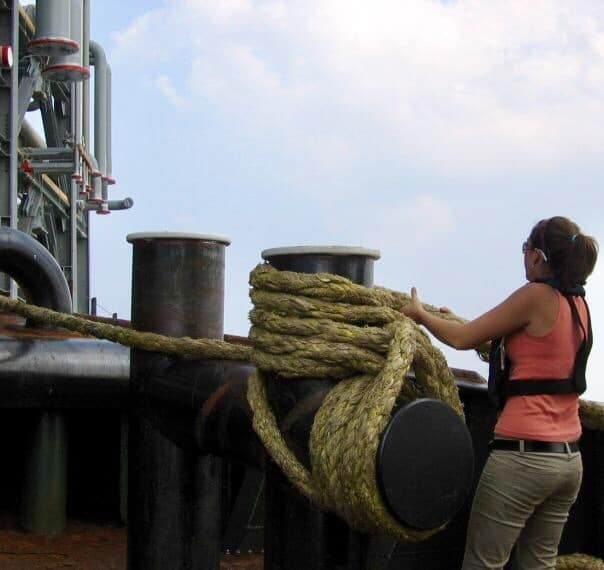
Please, tell us a story about a memorable experience working on the water.
“I’ve worked OSRVs (oil spill response vessels), ship assist, towed scrap barges, submarines and oil rigs, pushed oil in the ICW (Intracoastal Waterway), carried chemicals on an ATB (articulated tug barge) – but my answer to this is rather simple: There is nothing more memorable to me, than being on watch in the middle of the ocean, stepping out on the bridge wing to listen to your vessel breaking the waves, while looking up at a clear night sky and admiring the stars. There are very few people in this world that have that privilege and I am a member of the lucky few. What other job in the world allows you to experience such unique and wonderful things as those?”
What challenges have you faced in your career?
“I believe each promotion and each new job I’ve had, has presented a challenge to me, in and of itself. Each time was an opportunity to learn more by growing and honing my skills. Towing is a whole different ball game that presents unique challenges, dangers and risks. While it is exciting (and also, rather addicting), it is so very important to find and latch on to a good mentor every step of the way. We should be taking advantage of the knowledge and experience of older mariners (male or female) to overcome and persevere through these challenges. We shouldn’t reinvent the wheel, or rely solely on our maritime education from the academy. Steal the best practices from someone who has already done it! You’ll earn respect from your crew and make your job a whole lot easier.
One of the tug crews I worked with (fondly, called themselves ‘The Geriatric Crew’, being that I was one-third their ages) had an amazing captain and engineer that really taught me the ‘Tug Life.’ The captain took me under his wing and, to this day, I find myself remembering things he told me as I now operate my own vessel. I used to get upset when I didn’t dock the boat exactly the way I planned it out in my mind, even though the elements are constantly changing. He used to point out, ‘Did you get the boat to the dock?’ Yes. Did you break anything – body parts included? No. Well then calm the hell down! Goal accomplished!’ I, still, find those words comforting when things start to go sideways. The reality is that we work in a dynamic environment, so, the way we accomplish our daily goals is going to change every day and you have to be flexible! It doesn’t go perfectly every time and that’s ok! It’s all about how we adapt and overcome.
As for the engineer onboard, he was also a deck wizard who knew everything about making and breaking tow. Admittedly, there can be some physical challenges that come with being a skinny girl handling a line bigger than your thigh! But this engineer worked with me to use skill along with line manipulation – not brute strength – to get the same job done on deck so that I never fell behind. It’s people like these two men that really have helped me become as successful as I am today. I am very grateful for that.”
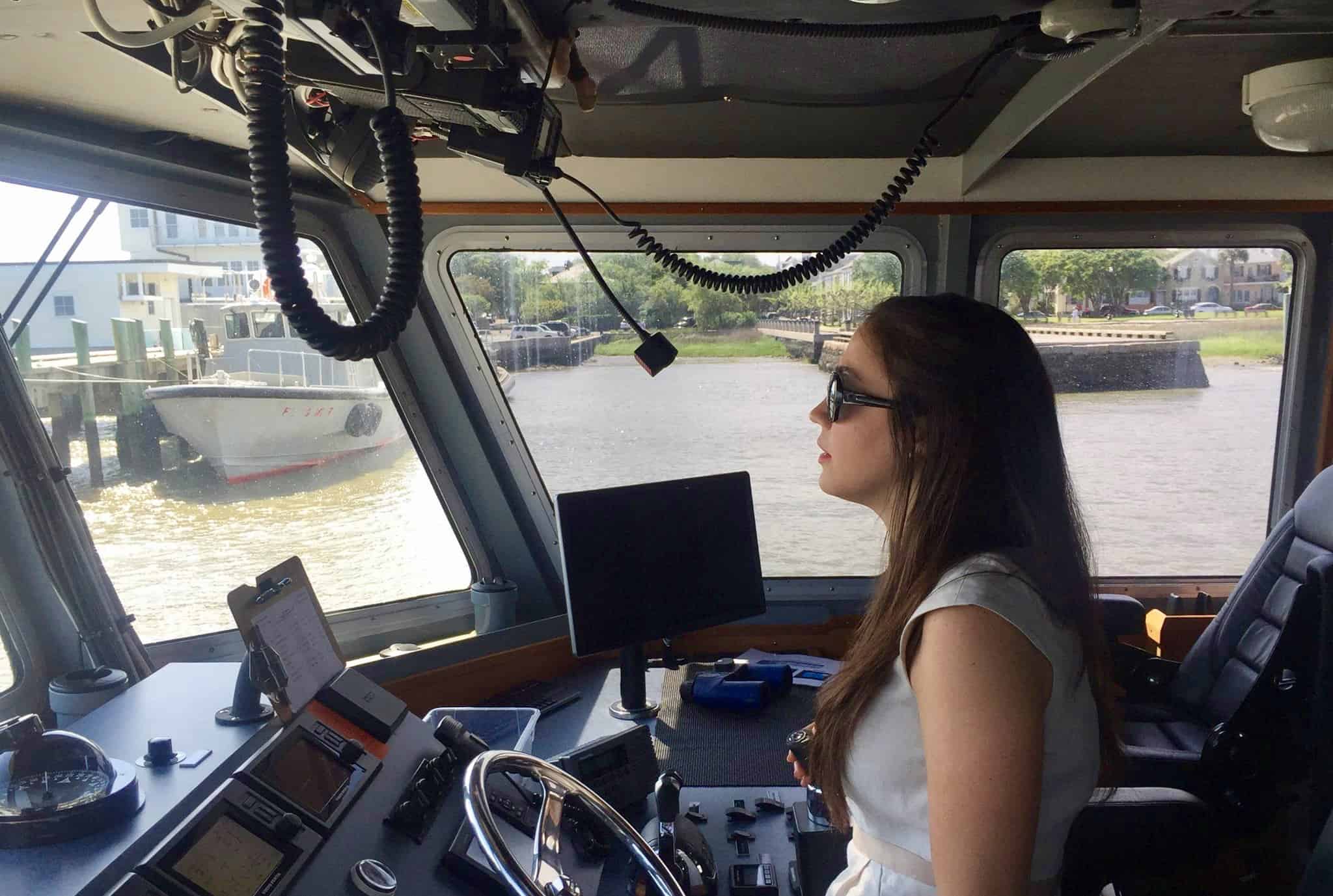
What do you think can be done in your industry to encourage more women to pursue similar careers?
“I believe one of the big deterrents for women to pursue careers in the maritime industry is because it can be difficult to ‘have it all’ – meaning, having a family and a career. This seems to be one of the main reasons women start out (or, not at all) in the field, but do not end up making it long-term despite having the desire. It is, admittedly, difficult for U.S. female mariners because the Jones Act was created at a time when there weren’t any females in the industry. Therefore, those provisions that are meant to protect the U.S. seaman do not tailor to the needs of women. The Maritime Labor Convention (MLC), in which other countries are also party to, does outline things such as maternity leave and protection. Currently, the U.S. believes that between the Jones Act & current federal regulations (that sometimes, do not apply to certain mariners on certain vessels – which was the case for me) cover the U.S. mariner and do not feel the need to ratify the MLC. This leads to a situration where it is becoming extremely difficult for women to take off the time needed for a life event, such as a pregnancy. I am passionate about this topic because I happen to be 38-weeks pregnant and my husband is a Chief Mate on ATBs, as I write this.
Due to the location & work environment, a female mariner is recommended to take maternity leave, a good 3 months prior to her shoreside counterparts (I worked on my vessel up to about the 6-month mark of my pregnancy), dependant on a pregnancy free of complications. Sadly, this means the Family and Medical Leave Act (FMLA) will not protect her job as long as she needs unless her company makes their own accommodations. I was lucky enough to be employed by a company that would work with me and my needs. However, not all women are as fortunate. I do remember dealing with the emotional roller coaster of ‘what ifs,’ prior to telling my supervisor. They were the typical fears our shoreside counterparts have – I was afraid they would find some way to get rid of me, or would be mad that they had invested time in me only to have me get pregnant.
In my opinion, it was exacerbated by the fact that there are really no loophole-free regulations to protect women in our field and NO ONE talks about it.
Most of the time, once a female mariner becomes pregnant this is the first time her company is not dealing, but reacting to that kind of scenario. Meaning, there are no company policies to refer to, no job reassurance, and Human Resources has to consult with corporate to even determine what the ‘new policy’ will be to handle this ‘unique’ situation. This creates extra anxiety that many women do not even want to deal with so they wait to come shoreside, telling themselves it’s for career progression – despite their desire to remain at sea and ultimately sacrificing this to have their children.
I believe if we were to all talk openly about this issue, involving companies and mariners alike, we would encourage more women to enter this field knowing that there are provisions and accommodations that can be made to allow a female mariner to ‘have it all.’ “
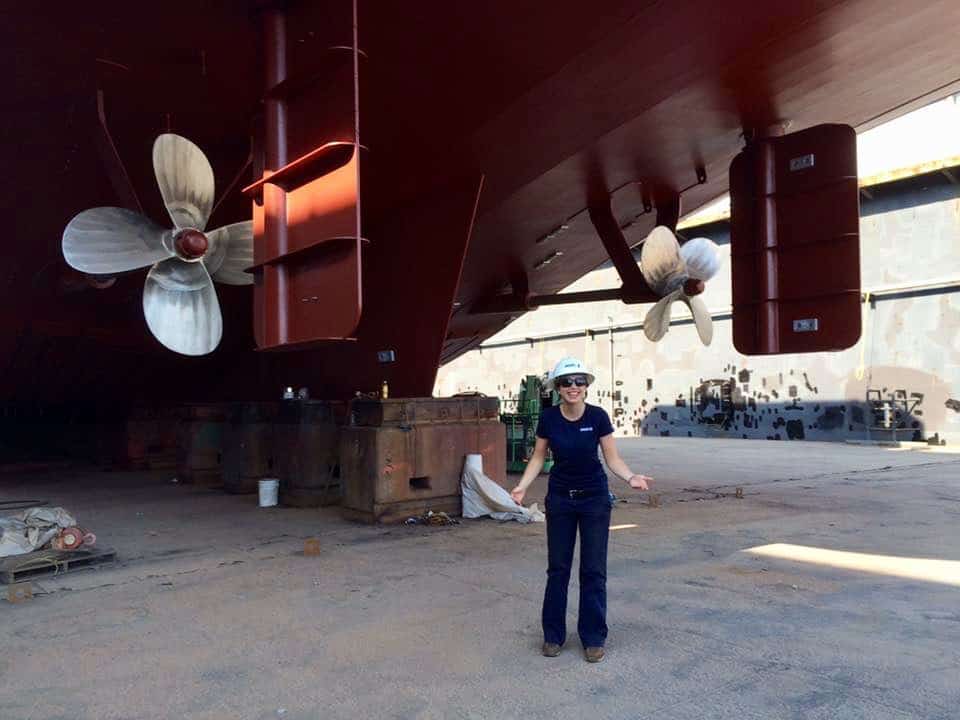
Is there anything else you would like to share with us?
“This may be a controversial opinion on a hot topic – but I do believe attitude has a lot to do with a females success offshore – I am directly looking sexism in the face, when I say this.
Where there ARE times of real sexism/harassment in any industry and those should be reported and dealt with appropriately; it’s important not to take everything so seriously. Coming from work boats where there are even less women than unlimited-sized vessels, I’ve almost exclusively worked with all male crews, at least 1 or 2 generations older than myself. Sometimes, I’m even the first female they have ever worked with! However, we become like family because there are so few of us on board, regardless of a few bad apples.
Bad Apple Examples: I’ve been called, by a marine joiner, ‘The Prettiest Captain in the Gulf of Mexico’; had an engineer ‘ground’ me from the engine room and, mockingly, call me by his daughters’ names (I was 19 at the time so, I guess that made sense?); had an entire tanker crew (it seemed) come out and take pictures of me as ‘the girl making up the head line on the assist boat’; been called a ‘Siren’ and told I was bad luck; had vendors not shake my hand, refuse to speak to me or even believe that I was the captain because I didn’t look like the old man of the sea – the list goes on and on.
I’ve learned to tune all those silly things out, take and enjoy the compliments, get a good laugh (sometimes, roll my eyes) and just continue to work hard to the very best of my abilities. If we, as women, take everything immediately to heart, we won’t ever be happy working offshore because there will always be some kind of problem. We should expect that everyone’s intentions are good, maintain our boundaries, and then we will be able to readily identify what actually is purposeful, harmful sexism and harassment. It’s ok to enjoy the ridiculous humor and well intended compliments of our male counterparts, without thinking it all is meant to do us harm.”
Thank you, Captain Sondra, for answering our questions! We admire your candor, greatly appreciate your thorough answers and hope that they reach and benefit all of our readers.

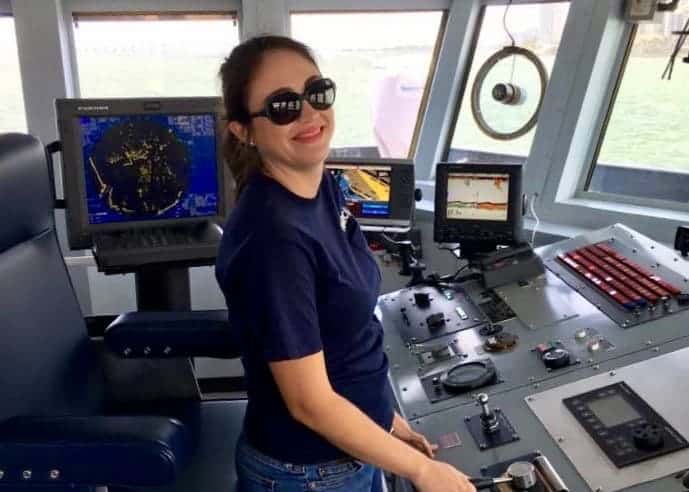

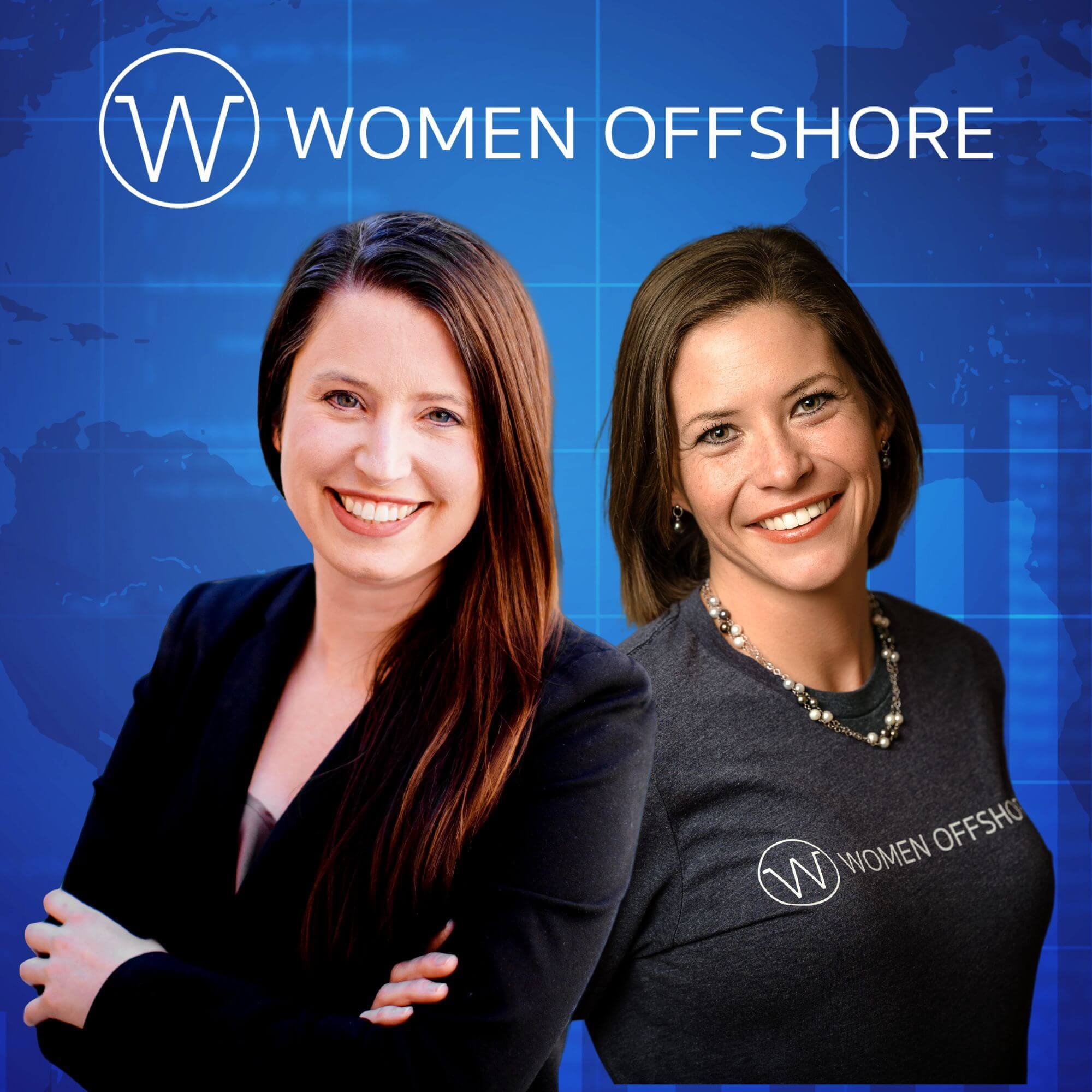
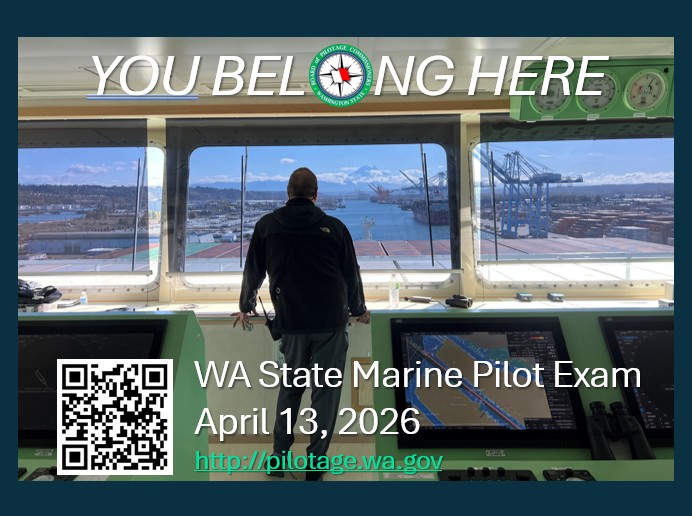

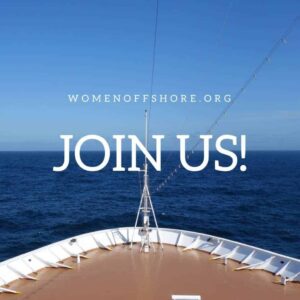
You go Sondra, did you happen to tell them your maiden name was Skipper?
I look back on that trip you made with me on the SIGNET COLUMBIA and think just how awesome you were, I am very happy to have worked with you.
Warm Regards,
Adml Tommy D.
Awesome interview, great insight!
Sondra, I love your article, it closely reflects my experiences as an engineer in the remote arctic, down to the detail of the sexist comments (I can’t believe that calling your cowokers by your daughter’s name’s is this widespread…). I especially appreciate your comment that minor sexist comments should just be tuned out, it’s good to know that being a woman offshore doesn’t have to mean reporting every minor indiscretion to HR, most of these issues can be more effectively resolved yourself.
As I’m also contemplating starting a family myself, I appreciate your open recognition that women frequently transfer to “safe” positions onshore or in central offices to pursue a family. Women will continue to make these choices until policies are implemented at the national level. Until then, many women will be limiting their careers and perpetuating the stereotype that women don’t want to work offshore or progress up the leadership ladder, to ensure that they can keep their jobs while pregnant and on maternity leave.
I’d love to hear more from you in the future, about how (or if?) you re-enter the offshore work environment in the future. In my experience, women can encounter HUGE difficulties getting back offshore after maternity leave.